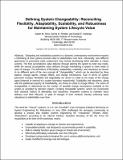Defining System Changeability: Reconciling Flexibility, Adaptability, Scalability, and Robustness for Maintaining System Lifecycle Value
Author(s)
Ross, Adam M.; Rhodes, Donna H.; Hastings, Daniel E.
DownloadCP_070624_Ross-Rhodes-Hastings_INCOSE.pdf (396.7Kb)
Terms of use
Metadata
Show full item recordAbstract
Designing and maintaining systems in a dynamic contemporary environment requires
a rethinking of how systems provide value to stakeholders over time. Classically, two different
approaches to promoting value sustainment may include developing either alterable or robust
systems. The first accomplishes value delivery through altering the system to meet new needs,
while the second accomplishes value delivery through maintaining a system to meet needs in
spite of changes. The definitions of flexibility, adaptability, scalability, and robustness are shown
to be different parts of the core concept of “changeability,” which can be described by three
aspects: change agents, change effects, and change mechanisms. Cast in terms of system
parameter changes, flexibility and adaptability are shown to relate to the origin of the change
agent (external or internal to a system boundary respectively). Scalability and robustness, along
with the additional property of modifiability, are shown to relate to change effects. The extent of
changeability is determined by the number of possible change mechanisms available to the
system as accepted by decision makers. Creating changeable systems, which can incorporate
both classical notions of alterability and robustness, empowers systems to maintain value
delivery over their lifecycle, in spite of changes in their contexts, thereby achieving value
robustness to stakeholders over time.
Date issued
2007Keywords
systems, value, flexibility, adaptability, scalability, robustness, changeability
Collections
The following license files are associated with this item: